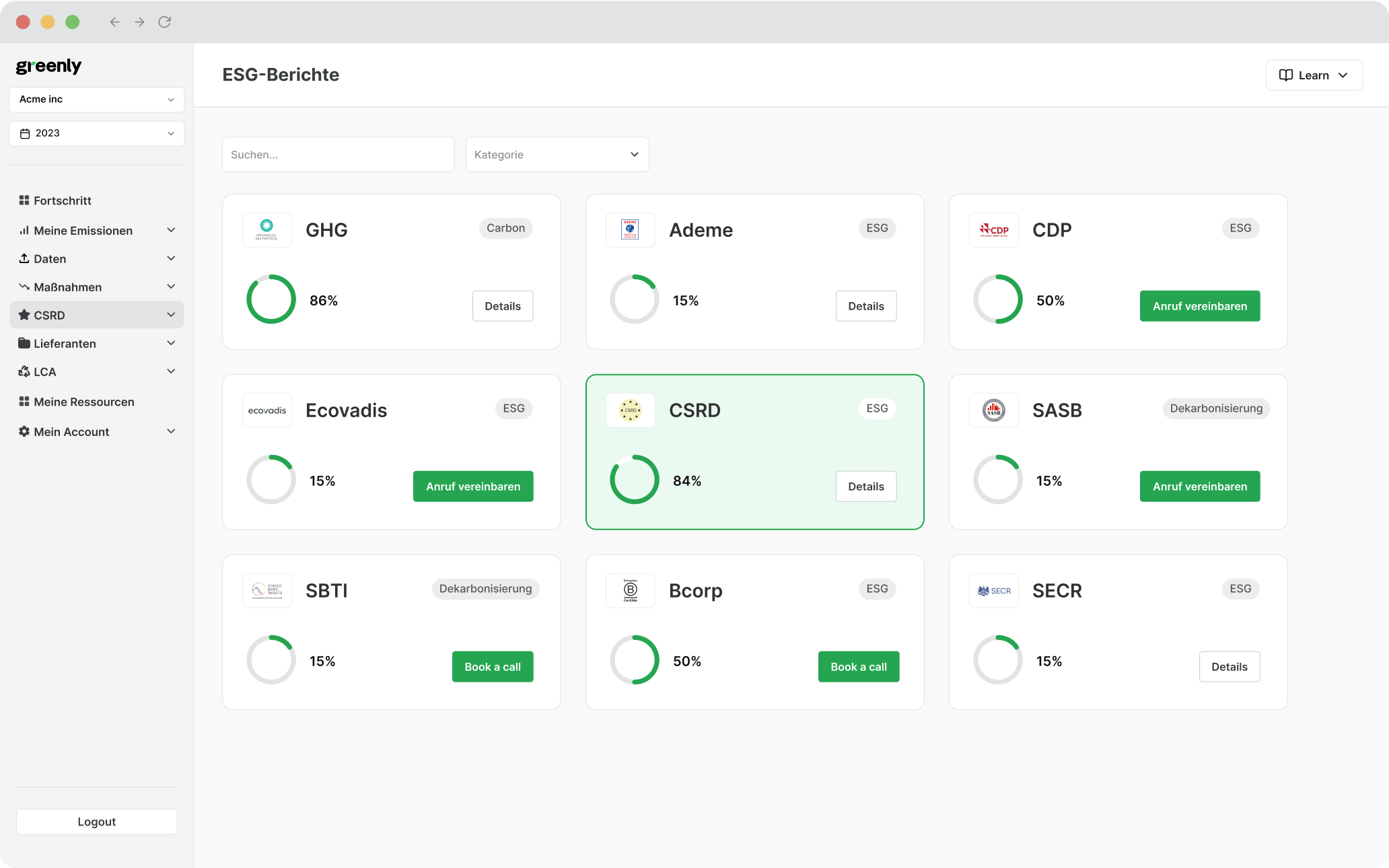
What are the 3 Pillars of Corporate Sustainability?
In this article, we'll explore what the 3 pillars of corporate responsibility are, why they're important, and how businesses can turn them into practical action.
ESG / CSR
Industries



Businesses are under increasing pressure to demonstrate real commitments to sustainability and social impact, but the path forward isn't always clear. With a growing backlash against ESG and mounting skepticism over reporting frameworks, companies are struggling to prove that their efforts are meaningful. In this landscape, how can they showcase real impact and avoid the pitfalls of greenwashing?
And big changes are coming!
In 2025, B Lab is rolling out new standards that will raise the bar for certification. Companies will no longer be able to qualify based on a flexible scoring system - instead, they must meet clear, sector-specific impact requirements. For example, businesses will be required to:
To qualify, businesses must go beyond profit-driven decision-making and commit to balancing purpose and profit. It’s about using business as a force for good and helping shape a more just, inclusive, and regenerative global economy.
As part of this mission, certified B Corporations join a growing global movement of like-minded businesses. As of 2025, over 9,400 companies around the world - from small enterprises to global names like Danone and Nespresso - have achieved B Corp status.
In recent years, questions have emerged about whether B Corp standards are rigorous enough, especially as larger corporations join the community. Under the current model, companies could qualify by scoring at least 80 points on the B Impact Assessment (BIA), a flexible system that allowed them to balance weaker areas with stronger ones. While this made the certification accessible, it also raised concerns that some businesses were skating through without truly addressing their biggest sustainability impacts.
To respond to these concerns and ensure B Corp certification remains meaningful, B Lab is rolling out a new set of standards in 2025. Moving forward, B Corp-certified businesses must meet explicit performance requirements across key sustainability and governance areas.
Every certified B Corp must:
One of the most significant aspects of B Lab’s new standards is a stronger focus on climate impact. Under the new standards, every company seeking B Corp certification must:
Previously, businesses could still qualify as B Corps even if they had weaker environmental scores - now, climate action is non-negotiable. Every B Corp must actively contribute to emissions reductions rather than simply offsetting their carbon footprint.
The new standards move away from a points-based system, where companies could qualify by excelling in certain areas while lacking in others. Now, businesses must meet clear performance criteria across all seven key Impact Topics.
Under the new model, companies must:
Every company must now prove measurable performance in seven key areas:
Each of these areas comes with specific, enforceable standards, ensuring companies focus their efforts on measurable, high-impact outcomes rather than generalized commitments.
B Corps have always been expected to integrate stakeholder consideration into their legal structure - but 2025 will tighten these requirements further.
To certify, companies must:
This ensures that B Corps are structurally committed to social and environmental responsibility - not just in practice, but in legal obligation.
Recognising that a tech startup and a large multinational have different sustainability challenges, the new standards introduce contextualization mechanisms to ensure fair and equitable implementation across industries and company sizes.
What this means:
This shift ensures that B Corp certification is both rigorous and attainable for businesses of all sizes.
The new 2025 standards raise the bar, making certification more meaningful but also more demanding. Businesses looking to certify will need to:
For companies that are already B Corps, these changes will apply upon recertification - so businesses must start adapting now.
B Lab doesn't just certify businesses - it collaborates with governments, policymakers, and advocacy groups to elevate sustainability standards globally. Some of its key policy initiatives include:
For businesses seeking or maintaining B Corp certification, B Lab's policy influence offers major advantages:
Future-proofing against regulations
Many governments are increasing corporate sustainability requirements. B Corps are ahead of the curve because they already meet strict accountability and impact standards.
Global recognition and edge
As sustainability regulations expand, B Corps stand out to investors, regulators, and consumers as leaders in ethical business practices.
Access to policy networks
B Corps aren't just businesses — they're part of a movement driving change. Certified companies can shape the future of corporate sustainability.
Here's how the process works under the updated system:
Only companies that meet all foundation requirements can proceed to the next stage.
Under the 2025 standards, businesses must meet performance requirements across seven key Impact Topics:
Unlike the old system, businesses must now meet thresholds in every area – not just an overall score.
This process can take up to 12 months depending on business size and complexity.
The entire process, from initial assessment to final certification, can take anywhere from 6 to 12 months.
B Corp is not a one-time achievement. Certified B Corp businesses must continuously improve to remain part of the B Corp community, facing recertification every three years under increasingly stringent standards - a process that ensures B Lab’s standards remain relevant in a rapidly changing world.
Every three years, companies must:
The new B Corp standards raise the bar significantly, making certification more demanding. Businesses planning to apply, or recertify, should start preparing now to keep pace with the evolving expectations of the B Corp movement by:
Becoming a B Corp-certified business is a significant investment, not just in terms of sustainability efforts and governance changes, but also in financial costs and time commitments. The 2025 certification updates make the process more demanding, meaning companies need to allocate sufficient resources to meet the new standards
Here's what businesses need to consider when planning for B Corp certification.
The cost of certification depends on company size and revenue. B Lab's fee structure ensures that smaller businesses pay lower fees, while larger companies contribute more due to the complexity of verification and auditing processes
To start the certification process, companies must pay a verification fee. This covers the initial assessment review and B Lab's audit process.
| Annual Revenue | Verification Fee (Total) |
|---|---|
| €0 – €4,999,999 | €2,500 |
| €5M – €49,999,999 | €5,000 |
| €50M – €99,999,999 | €7,500 |
| €100M+ | €10,000 |
Businesses pay this fee in two parts: 10% upon submission of the B Impact Assessment and 90% upon verification.
Once certified, companies must pay an annual membership fee to maintain their B Corp status.
| Annual Revenue | Annual Membership Fee |
|---|---|
| €0 – €2,499,999 | €2,000 |
| €2.5M – €4,999,999 | €2,500 |
| €5M – €7,499,999 | €3,000 |
| €7.5M – €9,999,999 | €4,000 |
| €10M – €14,999,999 | €6,000 |
| €15M – €19,999,999 | €8,500 |
| €20M – €29,999,999 | €12,000 |
| €30M – €49,999,999 | €16,000 |
| €50M – €74,999,999 | €20,000 |
| €75M – €99,999,999 | €25,000 |
| €100M – €174,999,999 | €30,000 |
| €175M – €249,999,999 | €35,000 |
| €250M – €499,999,999 | €40,000 |
| €500M – €749,999,999 | €45,000 |
| €750M – €1B | €50,000 |
These annual fees support B Lab's global operations, including platform maintenance, impact verification, and community-building efforts.

Despite the costs and time commitment, many businesses see B Corp certification as a strategic investment rather than an expense.
Key benefits of certification:
While becoming a B Corp-certified business is a rewarding achievement, the process can feel complex, especially with the new 2025 standards. Many companies face challenges along the way, from understanding the new requirements to implementing necessary changes across their operations.
Here, we outline the most common hurdles businesses encounter and how to overcome them:
| Challenge | Why it's difficult | How to overcome it |
|---|---|---|
| Meeting the New Climate Action Requirements | Businesses must now measure GHG emissions, set science-based targets, and develop a climate transition plan – a major challenge for those new to emissions tracking. |
|
| Meeting the New Legal Governance Commitments | Companies must legally commit to stakeholder governance, which may require bylaw amendments and internal restructuring. |
|
| Collecting & Disclosing Impact Data | Businesses must publicly report on wages, diversity, emissions, and supply chain practices, requiring strong internal tracking systems. |
|
| Managing the Time and Resource Commitment | The certification process can take 6–12 months, requiring significant internal resources. |
|
| Ensuring Continuous Improvement for Recertification | Certification must be renewed every three years, with businesses required to demonstrate measurable progress. |
|
B Corp certification has become a leading standard for businesses in the US that want to prioritize sustainability, accountability, and long-term impact. From independent startups to major players like Patagonia and Ben & Jerry’s, the US B Corp community continues to grow, proving that values-driven business is here to stay.
B Lab US & Canada, the regional arm of the global nonprofit, supports companies through the certification journey and plays a central role in shaping policy to promote stakeholder governance. Unlike many countries, the US formally recognises Benefit Corporations as a legal structure in most states, allowing businesses to embed their stakeholder commitments directly into their corporate DNA.
With increasing scrutiny around ESG claims and business ethics, becoming a certified B Corp offers US companies a credible way to build trust, track progress, and stand out in a competitive market.
Navigating the B Corp certification journey - especially under the revised 2025 standards - can be complex and time-consuming. Greenly streamlines the journey, providing expert guidance to help your business meet the environmental, social, and governance (ESG) requirements essential for certification.
Here's how Greenly supports companies throughout the B Corp certification process:
B Corp certification is evolving; ensure your company is prepared to meet the new requirements with Greenly's expert guidance.
